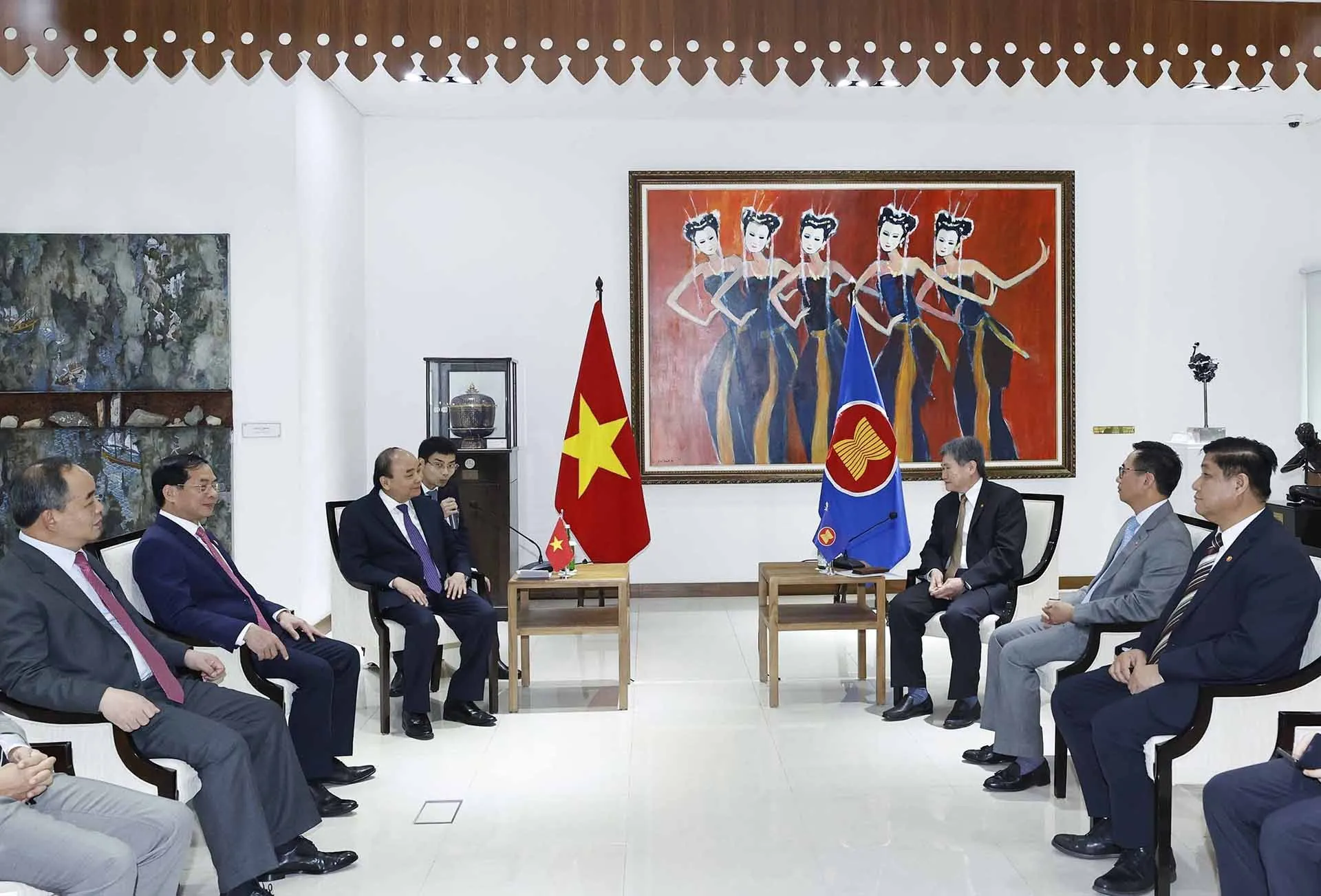Vietnam stresses importance of relations with ASEAN
Being a member of the regional group for 27 years, Vietnam has attracted external resources for economic development and expanded its diplomatic networks while the country’s diplomatic activism in recent years has reinforced ASEAN’s central role in addressing regional challenges.
Vietnamese President Nguyen Xuan Phuc has affirmed the country attaches importance to its relations with ASEAN, contributing to the unity of the bloc.
| Vietnam's President Nguyen Xuan Phuc meets ASEAN’s Secretary-General Lim Jock Hoi at the bloc's headquarters in Jakarta, Indonesia on Dec 23. Photo: VNA |
Phuc shared this view at the meeting with ASEAN’s Secretary-General Lim Jock Hoi at the headquarters of ASEAN in Jakarta, Indonesia during his visit to the country on December 21-23 at the invitation of Indonesian President Joko Widodo.
The Vietnamese president highlighted the role of ASEAN Centrality in the regional security architecture towards the building of the ASEAN Community in 2025.
Lim Jock Hoi said the foundation of ASEAN’s development is formed by the efforts of all members, including Vietnam, whose proactive and constructive role matters a lot to the ASEAN Community Vision 2025.
He said Vietnam’s membership in the group in 1997 has spurred the admission of other Southeast Asian members to make it a united and strong group today.
According to Lim Jock Hoi, Vietnam over the past 27 years has made significance to the group, through typical contributions namely the Hanoi Declaration and the Hanoi Plan of Action in 1998. In the chairmanship in 2020, Vietnam took the lead in responding to Covid-19 and promoting collective initiatives to help the region handle with the pandemic.
He said Vietnam has made efforts to boost regional development, therefore narrowing the gap among members. The country has also made important contributions to strengthening cooperation between ASEAN and its partners.
| ASEAN Flag raising ceremony opens in Hanoi in 2022. Photo: Baoquocte |
Regarding Vietnam’s role in the region’s Covid-19 response, Emeritus Professor Carl Thayer of the University of New South Wales (UNSW) in Canberra said Vietnam, as ASEAN Chair in 2020, has contributed to boosting ASEAN’s solidarity and cooperation on battling the pandemic and economic recovery.
Sharing with The Hanoi Times, Prof. Thayer said Vietnam has put forth several anti-Covid initiatives, proposals, and measures, including activating virtual channels to ensure continuous communication among ASEAN members, fostering coordination of dialogues with partners, providing medical equipment and protective gear to many countries in different continents, establishing a regional reserve for medical equipment and essential products to meet urgent requirements.
Vietnam pioneered the use of virtual conferences to bring together both key ministers and high-level government leaders to adopt policies for Southeast Asia as a region. Vietnam also used its extensive diplomatic network to solicit the support of major countries for ASEAN and its members, he said.
Prof. Thayer said all of ASEAN should be grateful that Vietnam was ASEAN Chair in 2020, adding that Vietnam quickly pivoted from “business as usual” to proactive leadership to address the Covid-19 pandemic on a regional and global basis. In sum, Vietnam’s handling of the Covid crisis, while ASEAN Chair and subsequently, demonstrate why it has the reputation of being a responsible member of the international community, he stressed.
Concerning Vietnam’s diplomatic activism in ASEAN, Phan Xuan Dung, Research Officer at the Vietnam Studies Programme, ISEAS – Yusof Ishak Institute, said accession to ASEAN in 1995 provided Vietnam with a springboard to pursue international integration, attract external resources for economic development, and expand its diplomatic networks.
Vietnam’s diplomatic activism in recent years has reinforced ASEAN’s central role in addressing regional challenges, Phan Xuan Dung told The Hanoi Times. The most illustrative example is Vietnam’s 2020 chairmanship, themed “cohesive and responsive ASEAN”. Hanoi’s leadership in steering the bloc through a tough year marked by the Covid-19 pandemic and intensified competition among major powers truly reflected this ‘cohesive and responsive’ spirit.
Hanoi’s efforts to consolidate ASEAN solidarity and enhance the bloc’s relations with dialogue partners should not be overlooked.
Hanoi is wary about the impacts of great power competition on regional peace and stability, as well as ASEAN’s centrality. Hence, Vietnam has urged external powers to adhere to the norms and principles set by ASEAN, lest more powerful states impose their will upon Southeast Asian countries.
Vietnam’s middle power diplomacy in ASEAN has strengthened the group itself and contributed to the preservation of regional peace and stability. The researcher noted that its championship of regional multilateralism and ASEAN centrality is welcomed amid growing challenges posed by non-traditional security threats and great power rivalry.











